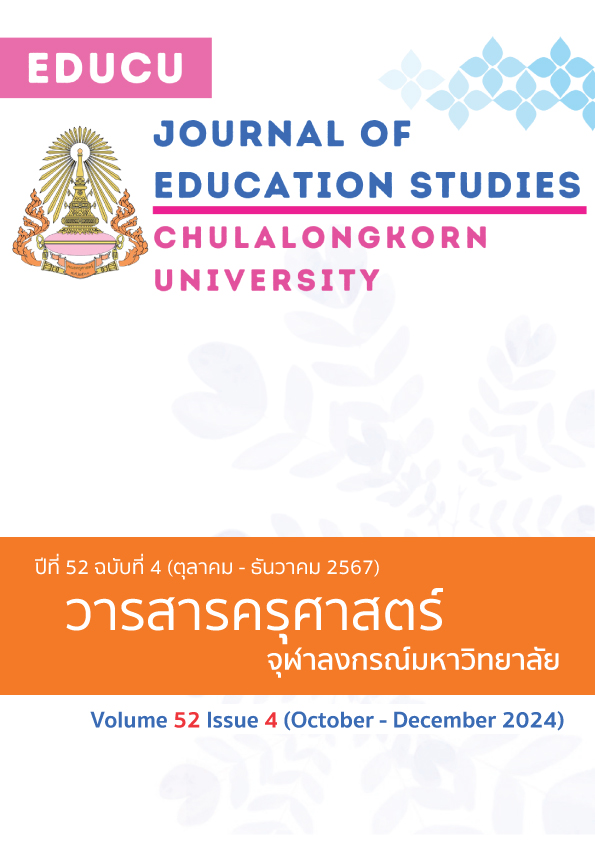Effects of Active Learning in Physics Experiments on Academic Achievement, Attitudes and Concepts among Grade-11 Students
DOI:
https://doi.org/10.14456/educu.2024.51Keywords:
active learning, physics experiment, attitudes towards physics, physics concepts towards physicsAbstract
One of the problems in learning physics is students’ attitudes. Most students think that physics is difficult to learn and to understand. This causes students' motivation and attitudes of curiosity towards the physics subject to decrease. The objectives of this work were to investigate students' attitudes towards physics and physics concepts, as well as to compare the academic achievement of the sample group before and after studying the lessons based on active learning through physics experiments. The sample group in this study consisted of 31 Grade 11 students, and data collection was conducted over the course of one semester. Data were collected using tests and questionnaires. The statistical methods used for data analysis included mean, percentage, standard deviation, and t-test. The physics taught in this work was based on active learning through physics experiments that emphasized students’ engagement in the learning process and doing experiments on their own. A physics achievement test and a questionnaire were used to evaluate students’ attitudes towards physics and physics concepts.
A dependent t-test was used for data analysis to compare post-test and pre-test scores of the sample. The results showed that the post-test scores were 68.39 percent higher than the pre-test scores with statistical significance at a level of .05. The greatest changes in regard to the attitudes towards physics and the perceptions of physics concepts among students that had experienced the lessons were as follows: The students perceived physics concepts better when they were closely linked to everyday life, and the students were better able to come up with ideas about the relationship between physics and real-life applications, respectively.
References
ภาษาไทย
ชมพู เนื่องจำนงค์, ภัทรยุทธ โสภาอัศวภรณ์, และ อัจฉรา ธนีเพียร. (2563). กรอบทักษะการเรียนรู้ในศตวรรษที่ 21 กับการจัดการเรียนรู้โดยใช้โครงงานเป็นฐาน. วารสารวิชาการ สถาบันเทคโนโลยีแห่งสุวรรณภูมิ, 6(1), 623-640.
ตวงรัก จิรวัฒนรังสี. (2558). ปัจจัยที่มีอิทธิพลต่อความรู้ ทัศนคติ และพฤติกรรมชองผู้ชมที่มีต่อ ความรุนแรงในสื่อ ศึกษาผ่านภาพยนตร์ เรื่อง Funny Games U.S. (2007) [การค้นคว้าอิสระ, มหาวิทยาลัยธรรมศาสตร์]. Thammasat University Library. https://ethesisarchive.library.tu.ac.th/thesis/
/TU_2015_5707010152_4325_3296.pdf
พรพิมล จันทาทอง, อรสา จรูญธรรม, และ นิติกร อ่อนโยน. (2562). การศึกษามโนทัศน์ทางการเรียนวิทยาศาสตร์
ของนักเรียนชั้นมัธยมศึกษาปีที่ 2 โดยการจัดการเรียนรู้ 5 ขั้นตอน ร่วมกับการโค้ชและจิตตปัญญาศึกษา. วารสารวิจัยและพัฒนา วไลยอลงกรณ์ฯ ในพระบรมราชูปถัมภ์ สาขามนุษยศาสตร์และสังคมศาสตร์, 14(2),
-280.
พระศรีญาณวงศ์ ปณฑิตเสวี, พระเมธีปริยัติธาดา จารุปญโญ, อภินันท์ จันตะนี, ชมพูนุช ช้างเจริญ, และ ราณี จีนสุทธิ์. (2564). จิตวิทยาการศึกษา. วารสารรัฐประศาสนศาสตร์ มหาวิทยาลัยราชภัฏสวนสุนันทา, 4(2), 70-82. https://so04.tci-thaijo.org/index.php/SSRUJPD/article/view/251027/172377
ภาคภูมิ เพ็งสุวรรณ และ แสงกฤช กลั่นบุศย์. (2559). การสำรวจทัศนคติที่มีต่อวิชาฟิสิกส์ของนักศึกษาชั้นปีที่ 1 ของมหาวิทยาลัยเทคโนโลยีพระจอมเกล้าธนบุรี. การประชุมทางวิชาการของมหาวิทยาลัยเกษตรศาสตร์ ครั้งที่ 54: สาขาศึกษาศาสตร์, สาขาเศรษฐศาสตร์และบริหารธุรกิจ, สาขามนุษยศาสตร์และสังคมศาสตร์, 54(1), 82-89.
มนต์สิทธิ์ ธรสิทธิโกศล และ มิ่งขวัญ ภาคสัญไชย. (2558). รูปแบบการจัดการเรียนการสอนแบบผสมผสานที่มีเจตคติ
ในวิชาฟิสิกส์ของนักเรียนระดับปริญญาตรี. วารสารวิชาการ Veridian E-Journal, 8(3), 880-888.
ราตรี เลิศหว้าทอง. (2565). การพัฒนาผลสัมฤทธิ์ทางการเรียนและพฤติกรรมการเรียนรู้การทำงานกลุ่ม โดยการจัดการเรียนรู้แบบเชิงรุก ของนักเรียนระดับชั้นมัธยมศึกษาปีที่ 5 โรงเรียนหนองสังข์วิทยายน สังกัดองค์การปกครองส่วนท้องถิ่น จังหวัดชัยภูมิ. วารสารสังคมศาสตร์ปัญญาพัฒน์, 4(1), 1-8.
สถาพร พฤฑฒิกุล. (2560). การบริหารการศึกษากับการเปลี่ยนแปลงในศตวรรษที่ 21. วารสารศึกษาศาสตร์ มหาวิทยาลัยบูรพา, 28(2), 36-49. https://buuir.buu.ac.th/xmlui/handle/1234567890/3451
สมโภช ศรีวิจิตรวรกุล. (2561). จิตวิทยาการเรียนรู้. จรัญสนิทวงศ์การพิมพ์.
สหวรัชญ์ พลหาญ. (2566). ทักษะแห่งอนาคตสำหรับคนรุ่นใหม่ : การทบทวนวรรณกรรมแบบกำหนดขอบเขต. วารสารศึกษาศาสตร์ มหาวิทยาลัยขอนแก่น, 41(1), 56-75. https://so02.tci-thaijo.org/index.php/EDKKUJ/article/view/259846
สุรางค์ โค้วตระกูล. (2556). จิตวิทยาการศึกษา. สำนักพิมพ์แห่งจุฬาลงกรณ์มหาวิทยาลัย.
อดุลย์ จาตุรงคกุล. (2543). พฤติกรรมผู้บริโภค. โรงพิมพ์มหาวิทยาลัยธรรมศาสตร์.
อิทธิเดข น้อยไม้ และ ณัฐวรรณ เฉลิมสุข. (2566). เสริมสมรรถนะผู้เรียนด้วยแนวคิดการจัดการเรียนรู้เชิงรุก. ครุศาสตร์สาร, 17(1), 13-23. https://edujournal.bsru.ac.th/publishes/22/articles/475
ภาษาอังกฤษ
Adams, W. K., Perkins, K. K., Podolefsky, N. S., Dubson, M., Finkelstein, N. D., & Wieman, C. E. (2006). New instrument for measuring student beliefs about physics and learning physics: The Colorado Learning Attitudes about Science Survey. Physical Review Special Topics - Physics Education Research, 2(1), 1-14. https://doi.org/10.1103/PhysRevSTPER.2.010101
Bonwell, C. C., & Eison, J. A. (1991). Active learning: Creating excitement in the classroom. In ERIC Publications. Office of Educational Research and Improvement (ED), Washington, DC.
Bybee, R. W., & McCrae, B. (2011). Scientific literacy and student attitudes: Perspectives from PISA 2006 Science. International Journal of Science Education, 33(1), 7-26.
Freeman, S., Eddy, S. L., McDonough, M., Smith, M. K., Okoroafor, N., Jordt, H., & Wenderoth, M. P. (2014). Active learning increases student performance in science, engineering, and mathematics. Proceedings of the National Academy of Sciences, 111(23), 8410-8415.
Hake, R. R. (1998). Interactive-engagement versus traditional methods: A six-thousand-student survey of mechanics test data for introductory physics courses. American Journal of Physics, 66(1), 64-74.
McCown, R. R., & Roop, P. (1992). Educational psychology and classroom practice: Partnership. Allyn and Bacon.
Perkins, K. K., Adams, W. K., Pollock, S. J., Finkelstein, N. D., & Wieman, C. E. (2005). Correlating student attitudes with student learning using the colorado learning attitudes about science survey. American Institute of Physics, 790(1), 61-64. https://doi.org/10.1063/1.2084701
Prince, M. (2004). Does active learning work? A review of the research. Journal of Engineering Education, 93(3), 223-231.
Redish, E. F. (2003). Teaching physics with the physics suite. John Wiley & Sons.
Redish, E. F., Saul, J. M., & Steinberg, R. N. (1997). Student expectations in introductory physics. American Journal of Physics, 66(3), 212-224.
Downloads
Published
How to Cite
Issue
Section
License

This work is licensed under a Creative Commons Attribution-NonCommercial-NoDerivatives 4.0 International License.




